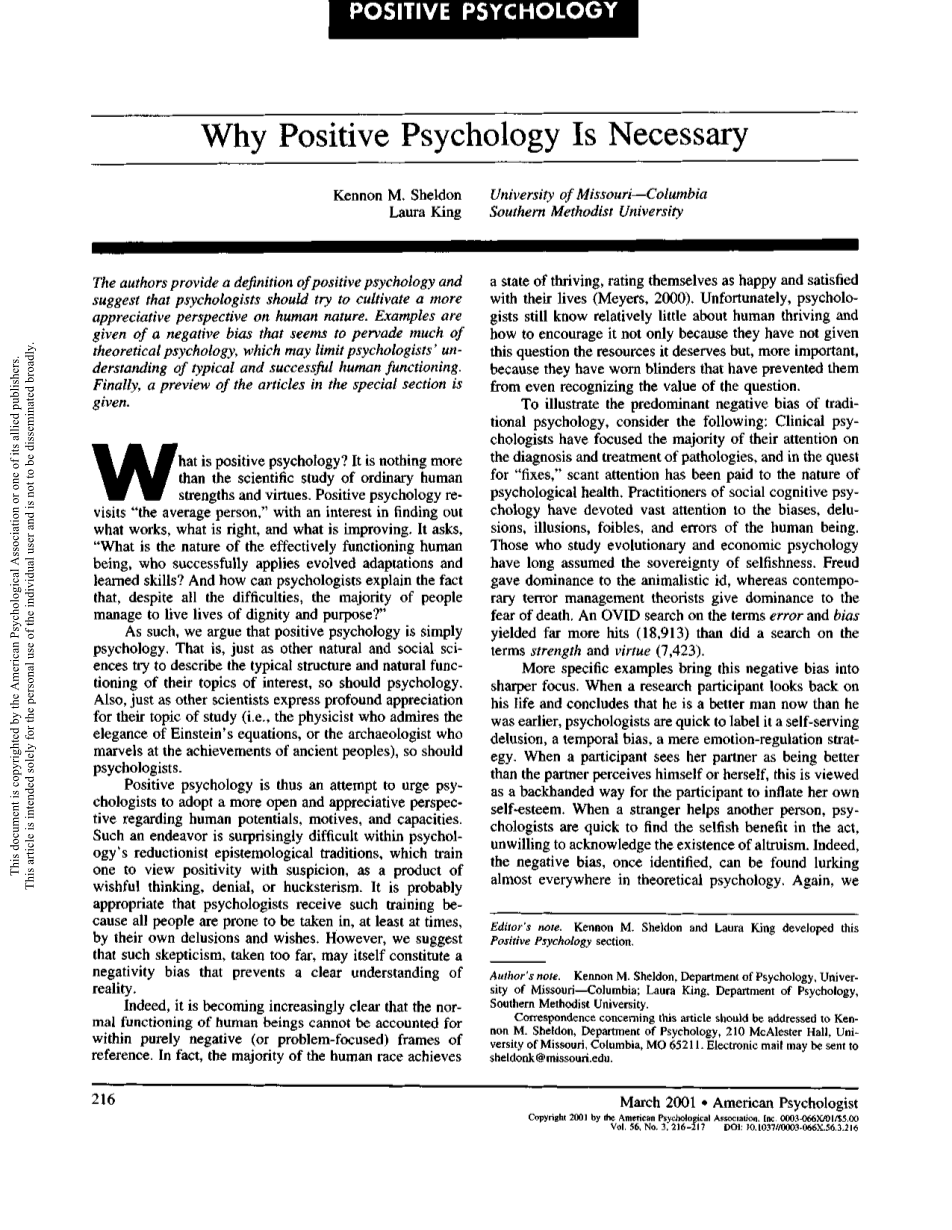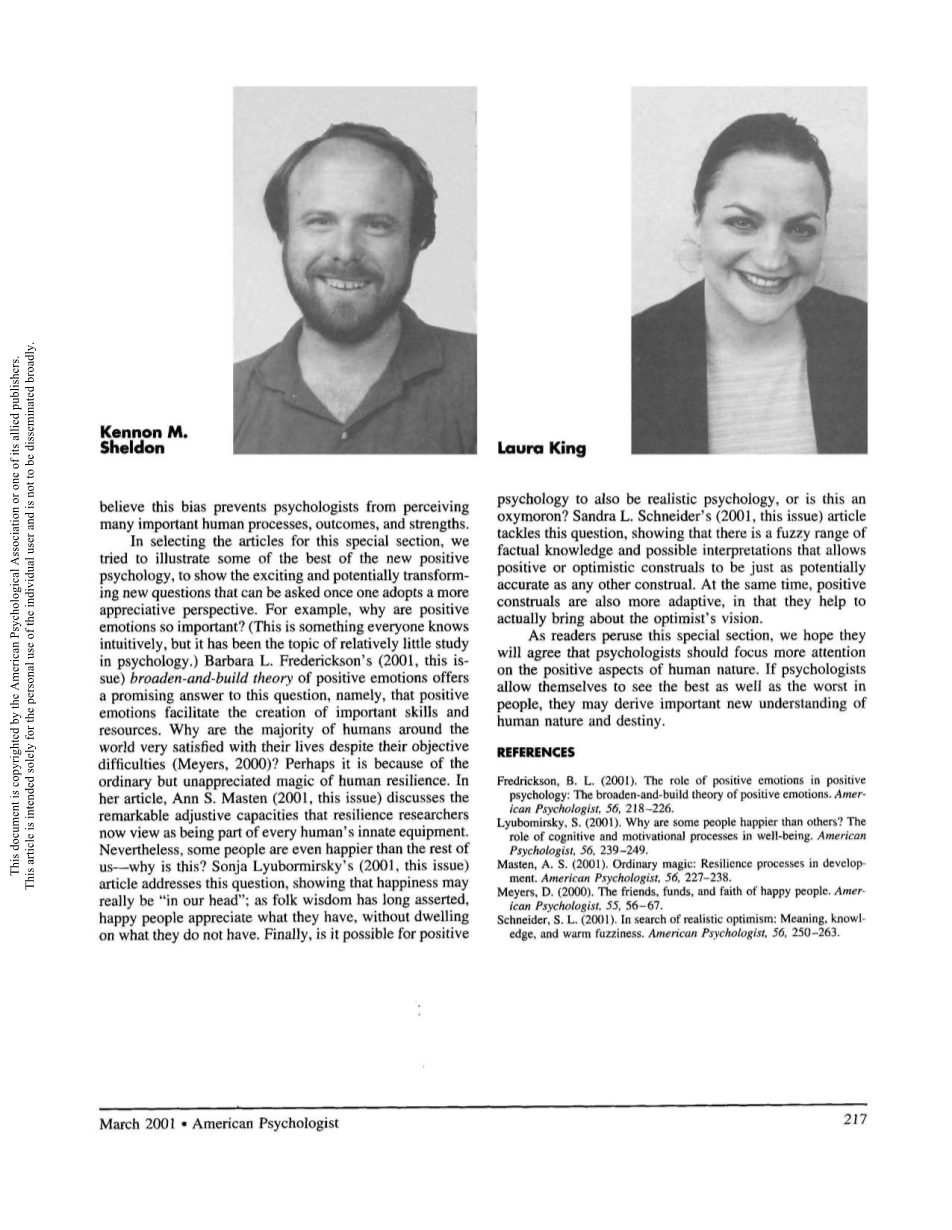为什么积极心理学是重要的
Kennon M. Sheldon,University of Missouri—Columbia
Laura King,Southern Methodist University
摘要:作者们提供了积极心理学的定义,并建议心理学家应该努力培养(人们)对人性更欣赏、更积极的方面的观点。他们提出负面偏见的例子似乎普遍存在于大部分理论心理学中,而这可能会限制心理学家对有代表性的和成功的人类功能的理解。最后,对专区中的文章进行了预览。
关键词:积极心理学
什么是积极心理学?它是对普通人的力量和美德的科学研究。积极心理学重新审视“普通人”,热心于找出什么是有效的,什么是正确的,什么是进步的。它问道:“成功地应用进化适应和学到的技能,有效运作的人的本质是什么?心理学家如何解释,尽管困难重重,但大多数人仍设法过上有尊严和有目的的生活?”
因此,我们认为积极心理学只是心理学。也就是说,正如其他自然科学和社会科学试图描述他们感兴趣的主题的典型结构和自然功能一样,心理学也应如此。此外,正如其他科学家对他们的研究主题(即欣赏爱因斯坦方程式优雅的物理学家,或惊叹于古人成就的考古学家)深表赞赏一样,心理学家也应该如此。
因此,积极心理学试图敦促心理学家对人类的潜力、动机和能力采取更开放、更欣赏的观点。 在心理学的还原论认识论传统中,这样的努力出人意料地困难,这些传统(观念)培养人们以怀疑的态度看待积极性,将其视为一厢情愿、否认或骗人的产物。心理学家接受这样的培训可能是合适的,因为所有人都容易被自己的错觉和愿望所吸引,至少有时是这样。然而,我们认为这种怀疑主义走得太远,它本身可能构成一种消极偏见,阻碍了对现实的清晰理解。
实际上,越来越清楚的是,人类的正常功能无法在纯粹的消极(或以问题为中心)的参考框架内解释。事实上,大多数人达到了一种蓬勃发展的状态,认为自己对自己的生活感到幸福和满意(Meyers,2000)。不幸的是,心理学家仍然对人的蓬勃发展以及如何鼓励它知之甚少,这不仅仅是因为他们没有为这个问题提供应有的资源,更重要的是,因为他们戴着眼罩,甚至无法认识到这个问题的价值。
为了说明负面偏见占传统心理学的主导地位,请考虑以下内容:临床心理学家将他们的大部分注意力集中在病理学的诊断和治疗上,而在寻求“修复”时,很少关注心理健康的本质;社会认知心理学的从业者对人类的偏见、错觉、幻觉、弱点和错误投入了极大的关注。研究进化心理学和经济心理学的人长期以来一直认为自私是至高无上的。弗洛伊德主导了原始本能的本我,而当代恐怖管理理论则主导了对死亡的恐惧。OVID搜索“错误和偏见”(error and bias)一词的点击率(18,913)远远高于搜索“力量和美德”(strength and virtue)一词的点击率(7,423)。
更具体的例子使这种负面偏见更加突出。当一名研究参与者回顾自己的生活并得出结论,他现在比以前更好时,心理学家很快就会将其称为自私的错觉、时间偏见、单纯的情绪调节策略。当参与者认为自己的伴侣比对方认为的自己更好时,这被认为是参与者一种转弯抹角的夸大自尊的说法。当一个陌生人帮助另一个人时,心理学家很快就会在行为中的私利,而不愿意承认利他主义的存在。事实上,负面偏见一旦被发现,几乎可以在理论心理学的任何地方发现。同样,我们相信这种偏见阻碍了心理学家对许多重要的人类过程、结果和力量的感知。
在为这个特别部分选择文章时,我们试图说明积极心理学的一些优点,以展示一旦人们采用更欣赏的观点就可以提出的令人兴奋且潜在转变的新问题。例如,为什么积极情绪如此重要?(这是每个人直觉上都知道的,但它一直是心理学研究相对较少的主题。)Barbara L.Frederickson(2001年,本期)拓宽并构建了积极情绪理论,为这个问题提供了一个有希望的答案,即积极情绪促进重要技能和资源的创造。为什么世界上的大多数人都对自己的生活非常满意,尽管他们有客观的困难(Meyers,2000)?也许这是因为人类韧性的普通但未被赏识的魔力。在她的文章中,Ann S.Masten(2001年,本期)讨论了非凡的调节能力,韧性研究人员现在认为这些能力是每个人与生俱来的能力的一部分。然而,有些人甚至比我们其他人更幸福——为什么会这样呢?Sonja Lyuomirsky(2001年,本期)的文章探讨了这个问题,表明幸福可能真的“在我们的头脑中”;正如民间智慧长期以来所断言的那样,幸福的人欣赏他们所拥有的,而不是沉浸在他们没有的东西上。最后,积极心理学有没有可能也是现实心理学,或者这是一种自相矛盾的说法?Sandra L.Schneider(2001年,本期)的文章探讨了这个问题,表明事实知识和可能的解释的模糊范围使得积极或乐观的解释与任何其他解释一样具有潜在的准确性。同时,积极的解释也更具适应性,因为它们实际上有助于实现乐观主义者的愿景。
当读者阅读这个特别部分时,我们希望他们会同意心理学家应该更多地关注人性的积极方面。如果心理学家允许自己既看到人的最好的一面,也看到人的最坏的一面,他们可能会对人性和命运产生重要的新理解。
外文文献出处:K. M. Sheldon amp; L. King (2001). Why positive psychology is necessary[J]. American Psychologist,56(3):216-217.
附外文文献原文
Why Positive Psychology Is NecessaryKennon M. Sheldon,University of Missouri—Columbia
Laura King,Southern Methodist University
The authors provide a definition of positive psychology and suggest that psychologists should try to cultivate a more appreciative perspective on human nature. Examples are given of a negative bias that seems to pervade much of theoretical psychology, which may limit psychologists understanding of typical and successful human functioning. Finally, a preview of the articles in the special section is given.
What is positive psychology? It is nothing more than the scientific study of ordinary human strengths and virtues. Positive psychology revisits “the average person,” with an interest in finding out what works, what is right, and what is improving. It asks,“What is the nature of the effectively functioning human being, who successfully applies evolved adaptations and learned skills? And how can psychologists explain the fact that, despite all the difficulties, the majority of people manage to live lives of dignity and purpose?”
As such, we argue that positive psychology is simply psychology. That is, just as other natural and social sciences try to describe the typical structure and natural functioning of their topics of interest, so should psychology. Also, just as other scientists express profound appreciation for their topic of study (i.e., the physicist who admires the elegance of Einsteins equations, or the archaeologist who marvels at the achievements of ancient peoples), so should psychologists.
Positive psychology is thus an attempt to urge psychologists to adopt a more open and appreciative perspective regarding human potentials, motives, and capacities. Such an endeavor is surprisingly difficult within psychologys reductionist epistemological traditions, which train one to view positivity with suspicion, as a product of wishful thinking, denial, or hucksterism. It is probably appropriate that psychologists receive such training because all people are prone to be taken in, at least at times, by their own delusions and wishes. However, we suggest that such skepticism, taken too far, may itself constitute a negativity bias that prevents a clear understanding of reality. Indeed, it is becoming increasingly clear that the normal functioning of human beings cannot be accounted for within purely negative (or problem-focused) frames of reference. In fact, the majority of the human race achieves a state of thriving, rating themselves as happy and satisfied with their lives (Meyers, 2000). Unfortunately, psychologists still know relatively little about human thriving and how to encourage it not only because they have not given this question the resources it deserves but, more important, because they have worn blinders that have prevented them from even recognizing the value of the question.
To illustrate the predominant negative bias of traditional psychology, consider the following: Clinical psychologists have focused the majority of their attention on the diagnosis and treatment of pathologies, and in the quest for “fixes,” scant attention has been paid to the nature of psychological health. Practitioners of social cognitive psychology have devoted vast attention to the biases, delusions, illusions, foibles, and errors of the human being. Those who study evolutionary and economic psychology have long assumed the sovereignty of selfishness. Freud gave dominance to the animalistic id, whereas c
剩余内容已隐藏,支付完成后下载完整资料


英语原文共 2 页,剩余内容已隐藏,支付完成后下载完整资料
资料编号:[592887],资料为PDF文档或Word文档,PDF文档可免费转换为Word
以上是毕业论文外文翻译,课题毕业论文、任务书、文献综述、开题报告、程序设计、图纸设计等资料可联系客服协助查找。


